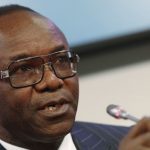To mitigate inflationary trends and price volatility, the Central Bank of Nigeria (CBN) has increased interest rate benchmark from 12 to 14 per cent. The CBN Governor, Godwin Emefiele, who disclosed this described the increase as a ‘difficult choice.’
The decision was taken by the Monetary Policy Committee (MPC) of the CBN Tuesday. Analysts, who expected a reduction, say the decision will lead to significant increase in cost of funds and disrupt efforts to kick-start growth.
Following successive negative growths in the last two quarters (six months) and persistent rise in prices of goods and services, government, late last week, admitted Nigeria is in recession. Nigeria’s economic data agency, the National Bureau of Statistics (NBS) confirmed that growth has entered a ‘negative territory’, hitting – 0.36 per cent in June.
Apex bank’s policy makers only tampered with the Monetary Policy Rate (MPR) from 12 per cent to 14 per cent, leaving Cash Reserve Ratio at 22.5 per cent; liquidity ration, 30 per cent and the Asymmetric Window at +200 and -500 basis points.
Already, the 200 basis points increase in effort to compensate investors due to the rising inflation, has been described as unprecedented, because most analysts had expected retained rate or 100 basis-point move.
“The action taken to combat inflation could serve to improve business confidence and corporate investments which will ultimately promote growth. The committee voted to increase Monetary Policy Rate by 200 basis points to 14 per cent which effectively narrows negative real rates to -2.5 per cent from -4.5 per cent. This was against our expectation that the Monetary Policy Rate will be left unchanged,” the President of Time Economics, Dr. Ogho Okiti said.
But Emefiele affirmed that the committee also considered the high inflationary trend, which has culminated in negative real interest rates in the economy, noting that this was discouraging to savings.
“The prolonged non-payment of salaries is a development, which has affected aggregate demand and worsened growth prospects. The committee weighed the risks of the balance of probabilities against growth and voted to hold, allowing fiscal policy some space to stimulate output with injections, but this has been long in coming.
“The negative real interest rates did not support the recent flexible foreign exchange market as foreign investors’ attitude had remained lukewarm, showing unwillingness in bringing in new capital under the circumstance.
“There existed a substantial amount of international capital in negative yielding investments globally and Nigeria stood a chance of attracting such investments with sound macroeconomic policies.
“Consequently, members were of the view that an upward adjustment in interest rates would strongly signal not only the Bank’s commitment to price stability but also its desire to gradually achieve positive real interest rates.
“Such a decision, it was argued, gives impetus for improving the liquidity of the foreign exchange market and the urgent need to deepen the market to ensure self-sustainability. Members were of the opinion that this would boost manufacturing and industrial output, thereby stimulating growth which is desired at this time,” he said.
By the action, CBN is hoping to lure more foreign bonds investors although, with inflation hitting a decade-high of 16.5 per cent in June, rates are still in negative territory of -2.5 per cent, but better than -4.5.
He reiterated that the economy was passing through a difficult phase, dealing with critical supply gaps, underscoring the imperative of carefully navigating the policy space to engender growth and ensure price stability.
The bank chief affirmed that its policy makers were confronted with two options —restarting growth or fighting inflation.




